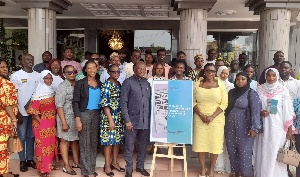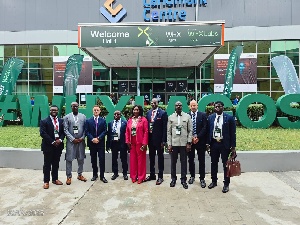- Home - News
- Elections 2024
- News Archive
- Crime & Punishment
- Politics
- Regional
- Editorial
- Health
- Ghanaians Abroad
- Tabloid
- Africa
- Religion
- Photo Archives
- Press Release
General News of Thursday, 27 March 2025
Source: www.ghanawebbers.com
MFWA urges gov’t to act against tech firms spreading misinformation
The Media Foundation for West Africa (MFWA) has called on the Government to act decisively against technology firms and media houses. These entities often allow their platforms to spread misinformation, disinformation, and divisive narratives.
MFWA also urges media organizations, political parties, and civil society groups to educate citizens. They should provide knowledge and skills to help people identify fake content. This is crucial for reducing the spread of half-truths in some media outlets.
These recommendations come from an MFWA study on misinformation in Ghana. The study was launched in Accra on Wednesday. It found that spreading half-truths is common in Ghana, mainly by political actors, media, and influencers.
Social media is a major tool for misinformation. However, mainstream media with political ties also spreads hate speech and disinformation without consequences. Many media houses lack awareness of ethical codes guiding their conduct.
The report confirmed that hate speech peaked during general elections in Ghana. Some foreign interests exploit this situation to influence decisions in Africa. The study categorized misinformation into political, religious, economic, and scientific types.
It noted that some journalists fail to verify information before publishing it. Economic disinformation is rising due to cashless initiatives. Religious disinformation fuels tensions while political disinformation spikes during elections.
The Foundation calls for community outreach about the harmful effects of misinformation. It emphasizes creating fact-checking desks in newsrooms for accurate reporting.
All key players should enhance educational programs targeting vulnerable youth. MFWA encourages forming networks against misinformation and hate speech at local and regional levels.
Technology firms like Facebook, X, TikTok, and WhatsApp must flag false content before it reaches the public. They should be regulated similarly to practices in the Global North.
Media content also needs regulation with sanctions for violations introduced and enforced. Ms Kathleen Addy from the National Commission for Civic Education (NCCE) noted that social media algorithms prioritize engagement over accuracy.
This amplifies falsehoods and makes it hard for people to discern truth from lies. AI-generated content can manipulate public opinion as well. She stressed balancing free speech with responsibilities to curb misinformation's spread.
Mr Hooman Nouruzi from the British High Commission highlighted the UK’s commitment to strengthening governance in Ghana. He emphasized tackling misinformation as vital for deepening democracy there.
He stated that safeguarding against misinformation is essential to prevent foreign interference through false narratives. An independent media fosters public trust; thus journalists must be agents of change.











